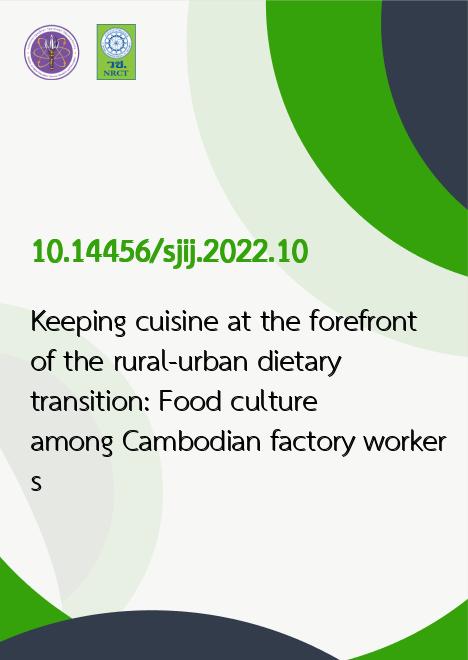
|
Keeping cuisine at the forefront of the rural-urban dietary transition: Food culture among Cambodian factory workers |
|---|---|
| รหัสดีโอไอ | |
| Creator | Sary Seng |
| Title | Keeping cuisine at the forefront of the rural-urban dietary transition: Food culture among Cambodian factory workers |
| Contributor | Hart N. Feuer |
| Publisher | Foundation of Just Society Network |
| Publication Year | 2565 |
| Journal Title | Social Justice and Inequality Journal |
| Journal Vol. | 3 |
| Journal No. | 3 |
| Page no. | 46-56 |
| Keyword | Khmer cuisine, Rural-urban dietary, Food culture, Cambodian, Factory workers |
| URL Website | https://journalsocialjustice.wordpress.com/ |
| Website title | Social Justice and Inequality Journal |
| ISSN | 2730-2172 |
| Abstract | This paper departs from multi-lateral, governmental, and non-governmental organization (NGO) reports and academic work in that it squarely seeks to determine how the existing systems of nutrition and food provision can play a role in improving workers health conditions. Ethnographic research method was employed to explain why the contradictory conclusions documented above arise by exploring a domain little covered by project evaluation based, technocratic research. In part, we do this by replicating the basic research methodologies used by numerous studies in evaluating the link between behavioral patterns and dietary outcomes and by triangulating these with participant observation and long-term food diaries that particularly focus on the skills and lived food environment of workers. The food systems that have developed alongside dense factory areas in the Phnom Penh metropolitan areas are not ideal from the perspective of hygiene, but they have co-evolved with factory workers and their preferences for over two decades. While external interventions, such as canteens, can achieve a marginal increase in nutrition outcomes, they also rob workers of their independence in dietary management and food preference. The consistent support for canteens is sustained by the patriarchal view, present among government, civil society, and factory managers, that factory workers lack the agency to navigate the turbulent food systems which they are faced with. Certain evidence, however contradictory, seems to confirm that workers are unable to achieve optimal dietary outcomes, especially during vulnerable “child-bearing years”. The long-term result has been a disregard for interventions that might improve the existing system and leverage its inherent efficiencies and scope for empowering workers. The extent of this disregard is such that factory workers are meant to feel ashamed for eating food near the factory gates or nearby markets, rather than given a chance to articulate how these systems could be improved for their benefit. This leads to a lack of creativity in the range of solutions suggested and adopted in the garment and footwear sector. |